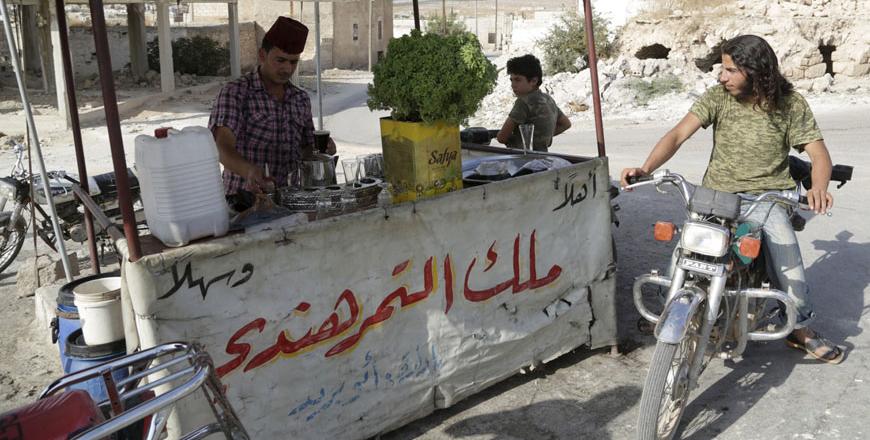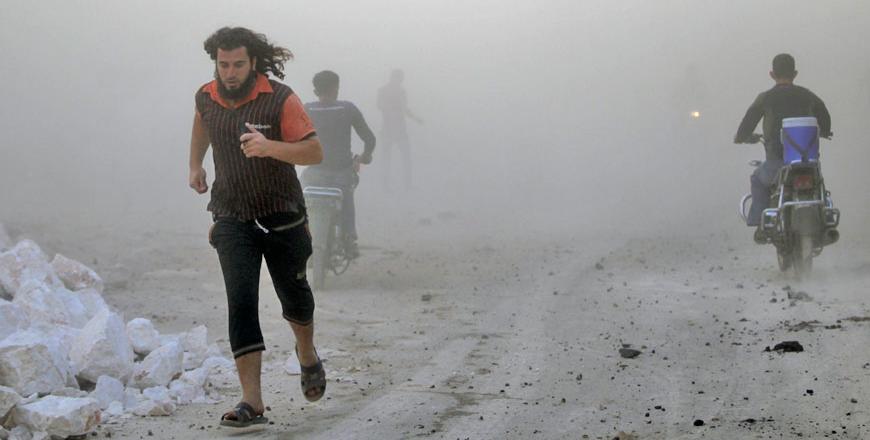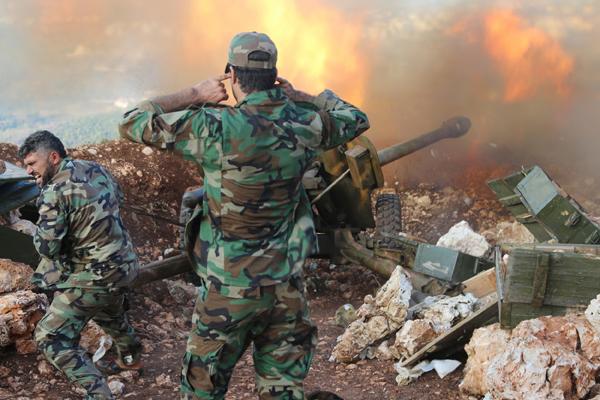You are here
Syrian rebels fortify front line with anti-tank missiles
By Reuters - Oct 13,2015 - Last updated at Oct 13,2015
BEIRUT — Syrian insurgents are deploying extensive supplies of anti-tank missiles provided by their foreign backers to counter ground attacks by the Syrian army and its allies, backed by heavy Russian air strikes, rebel commanders said on Tuesday.
Two rebel commanders contacted by Reuters declined to confirm whether they had received additional missiles since the Russian air strikes began, but said they had "excellent" supplies and were stationing them along a 30km front to halt the ground offensive.
Activists, however, said supplies had been stepped up since the Russian air strikes began on September 30.
With the Russian air support and help from Lebanon's Hizbollah and Iranian soldiers, the Syrian army is trying to drive insurgents from western areas that are crucial to President Bashar Assad's survival, and has recaptured a number of towns in the provinces of Hama and Latakia.
Russia's two-week old air campaign has bolstered Assad and left the United States struggling to adjust its troubled military support programme for Assad's opponents. On the ground, however, the Syrian army is not making rapid gains.
The Syrian Observatory for Human Rights, a British-based group tracking the war, said a battle was in progress for control of the town of Kafr Nabuda in Hama province, which the army said it captured on Monday. At least 25 fighters on the government's side were killed, it said.
The town marks the western edge of the defensive line along which the rebels have stationed a dozen anti-tank missile launch platforms, said Ahmed Al Seoud, head of the 13th Division, a foreign-backed faction fighting under the umbrella of the Free Syrian Army.
"They are highly effective. They are breaking the Russian-Iranian and Syrian army," he said. "The situation in terms of ammunition and weapons with the Syrian opposition is excellent."
Foreign states opposed to Assad have supplied the TOW guided missiles to a number of rebel groups via an operations room in Turkey, one of the states in the region that wants Assad gone.
The missiles have been widely seen as important to rebel advances earlier this year that had put Assad under pressure.
The observatory’s director, Rami Abdulrahman, said the rebels were using significant numbers of TOWs. “It increased in the last days, and it has proven its effectiveness,” he said.
Ibrahim Al Idlibi, an activist who acts as media adviser to several FSA groups in northern Syria, said several dozen army vehicles had been destroyed by TOW missiles in recent days.
“In the last period, the quantities have increased.”
Looking for support
The rebels are hoping for more military support from Arab states, notably Saudi Arabia, which has warned Russia that its intervention will escalate the war and inspire more foreign fighters to go to Syria to fight.
Fares Al Bayoush, a former Syrian army colonel who heads the Fursan Al Haq group, also spoke of a battery of TOW missile platforms stretching east along the frontline from Kafr Nabuda to the village of Maan.
The aim is to stop government forces advancing north from Morek to rebel-held Khan Shaykhoun, both towns on a northsouth highway linking the city of Hama to Aleppo and Idlib.
“We have an excellent supply of missiles,” Bayoush told Reuters from Syria, via an internet-based messaging system. “We will, God willing, move to attack, not just defence.”
Echoing that hope to go back on the offensive, an alliance of insurgents that has been targeted by Russian air strikes said on Tuesday it was starting an operation to recapture Hama.
The Army of Conquest, which captured most of the neighbouring Idlib province in May, includes Al Qaeda’s Syria wing Al Nusra Front, the Islamist Ahrar Al Sham faction and groups including Chechen and central Asian fighters. But it will struggle to advance in the face of the Russian air strikes and Syrian army assault, Abdulrahman said.
Both sides have sent reinforcements to the area. Hizbollah has redeployed all its fighters in Syria to take part in the battle in the northwest, according to sources familiar with political and military developments in Syria.
A Hezbollah officer was killed on Monday in Idlib province, a Lebanese security source said. A senior Hizbollah commander, Hassan Al Haj, was also killed in the same area in recent days.
Abdulrahman said insurgents sent to Kafr Nabuda — many of them from jihadist groups — had helped prevent the army from recapturing the town.
Rebel fighters and weapons also arrived in the strategically important Ghab Plain on Monday, a rebel fighter in the area said. The Ghab region lies next to the mountains that is the heartland of Assad’s Alawite sect. He said one of the groups there was also using TOW missiles.
Russian embassy attack
Two shells landed near the Russian embassy in Damascus on Tuesday, while a small pro-Moscow demonstration was taking place, but there were no reports of casualties or damage to the embassy building.
Interfax news agency said Russia’s air force carried out 88 sorties in the last 24 hours, one of the biggest totals of its campaign.
Moscow says its air campaign has targeted Daesh militants, although many of its strikes have taken place in territory controlled by rival rebel group supported by Assad’s foreign enemies, prompting Western condemnation.
Syria’s foreign ministry responded on Tuesday, saying Europe was trying to misrepresent the Russian intervention, which it said had “demonstrated the credibility and determination of the Russian and Syrian leadership to combat terrorism”.
A ministry source quoted by state media said the Russian campaign came in response to a formal Syrian request — unlike air strikes carried out by US-led coalition — “and these joint efforts will find the appropriate circumstances to launch the political path to solve the crisis in Syria”.
The Russian intervention in the four-year Syrian war has caught US President Barack Obama’s administration off guard. Washington has been trying to defeat Daesh while still calling for Assad’s downfall.
On Sunday, US forces airdropped small arms ammunition and other supplies to Syrian Arab rebels in the east of the country. Rebels there said the arm supplies could mark the preparation for an offensive in the coming weeks against the Daesh stronghold of Raqqa city.
Related Articles
BEIRUT/AMMAN — Rebels battling the Syrian army and its allies near Aleppo said on Monday they had received new supplies of US-made anti-tank
BEIRUT — Syrian rebels fighting under the banner of the Free Syrian Army (FSA) said Russia must stop bombing them before talking about helpi
BEIRUT — Daesh militants battled rival insurgent groups on Wednesday north of the city of Aleppo, where officials say the Syrian army is pre














